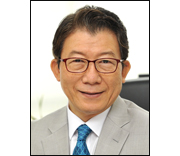-
[March 22. 2017 Korea times] Betting on ROK’s economic resilience
- Date : 2017.05.08
- Views : 392
Betting on ROK’s economic resilience

By Jeffrey I. Kim
The world is closely watching the development of the political and security situation on the Korean peninsula.
On March 10, former President Park Geun-hye’s impeachment was upheld. The Republic of Korea (ROK) will have a new president on May 10.
During the election campaign, there will be hot debates on policy promises among different candidates.
The competition in the presidential election may be understood as fighting between right-wing conservatives and left-wing progressives. Many people are concerned that the Korean economy may lose its growth engine and fall into a low-growth trap that it can never get out of.
However, major foreign investors are not that pessimistic. We took a telephone survey asking how they felt about post-impeachment Korean economy. Surprisingly, they were calm and said that the Korean economy would be little affected by political uncertainty. Most of them have been operating their business in Korea for many years.
They did not seem to dwell on what has happened in the past but rather they want to look to the future prospect of their business conditions. The leaders of foreign-invested companies had a basic understanding of the structure of the Korean economy and had strong confidence in Korea’s post-election economy.
Foreign investors have various reasons why they are optimistic about the overall Korean economy. They include: (1) The Korean economy is resilient enough to sustain its competitive edge, (2) Korea is a highly industrialized economy producing high-value heavy and petro-chemical products, which brings about a lot of forward and backward linkage effects, (3) A large proportion of foreign firms is engaging in the production of intermediate products including precision equipment and machinery, (4) Most of their products are automatically delivered over to large companies, and (5) Compared to other countries, Korea belongs to a group of the five best countries for doing business.
Also foreign investors understand that their future business conditions largely depend on who will be the next president. They hope that the next leader will be the one to whom most Korean people can give trust. The next president does not have to be super smart in everything. The most desirable for the new head of state is to have the most competent and honest officials around that they can easily reach and talk with.
Last but not least, they hope that the new president will be one who believes in the working of free market capitalism. The World Bank Group and other international organizations greatly acknowledge that the ROK is an exemplary country that became an OECD member by adopting the free market system.
To become the nation’s successful leader, next president’s welfare policy must be successful. Welfare spending should not aim at radically reducing economic inequality. Welfare beneficiaries should be limited to those who cannot stand on their feet by themselves. Otherwise, welfare policy only wastes taxpayers’ money.
To implement appropriate welfare policy, the new president should understand that political equality and economic equality are not compatible. Dr. Yaron Brook of the Ayn Rand Institute argues that economic inequality per se is neither good nor bad. Political equality can be understood as the view that the government should protect the equal individual rights of life, liberty and property ownership.
By the freedom of choice which comes under the category of political equality, some will choose to get less education than others and tolerate a low-paying job later. Some will choose to go into high-pressure and high-paying fields. Paradoxically, therefore, if the government emphasizes more economic equality, it can bring about greater political inequality. By similar reasoning, if the government aims at more political equality, it will raise economic inequality.
The argument for economic equality is based on the fixed-income assumption. Given society’s fixed income, one person’s gain necessarily comes at other people’s expense. In reality, however, society’s income increases due to innovative work. If the government discourages innovative work, economic inequality will be reduced. But poor people’s welfare will be cut as society’s total income shrinks. Consequently the government’s policy to reduce economic inequality will only hurt poor people.
With the presidential election less than two months away, foreign investors are betting on Korea’s economic resilience. If a new president distinguishes between political equality and economic equality and has a proper welfare policy, the business environment for foreign investors will improve significantly.
http://www.koreatimes.co.kr/www/opinion/2017/03/198_226110.html










